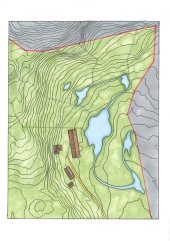
 1
1




 1
1




 1
1





Idle dreamer








 1
1









 1
1




Kris Minto wrote:Thanks for the feedback Cris. My parents in-law have a medium size preform pond they no longer want so I will be putting it across the yard from where my future large pond will go. I will try see to see if I get the same results you got Cris.
Kris




Cris Bessette wrote:I have two small hand dug ponds in my front yard- each holds maybe a few thousand gallons.
These ponds are filled only by rain and run off from my roof. I have a number of types of water plants, frogs, goldfish, various insects,etc. that live in the ponds.
As for algae, I've never had a problem with it. The plants suck off the extra nutrients, and they prevent blooms of algae by blocking too much sunlight.
If anything, you can harvest any algae and use it in compost, or just sling it under the nearest bush- it is an organic material. This is what I did in the past before the flora/fauna in the ponds stabilized. Now that they are stabilized, algae just doesn't grow.

 1
1




 1
1




Cris Bessette wrote:
"I came across this discussion after having posted a few questions regarding pond construction, in another thread.
I'm curious about your ponds. What lining did you use, and how far are they from the house?"
Hi, Levente, I used standard pond liner material for both, they are basically rubber sheets, but there is a line pattern on the "up"side that helps
organic materials be able to grab on (moss,etc). Under the liner are scraps of old carpet to keep rocks and roots from poking through.
The ponds are both about 5-6 feet (1.5 - 2 meters) from the house. Basically just enough room for a walking path between the house and ponds.
I dug a third pond hole further out in the middle of the yard.
This is my "experimental pond". Currently this "pond" is only full of water after a day or so of heavy rain. I don't want to use a liner in this one so I am trying to seal it a natural way.
Grass and other plants have taken over the hole, and every time there is heavy rain, some of the plants drown and become organic material for the next layer of plants. My theory is that within time, the hole will start holding water longer as more and more organic material clogs the pores.
If not, then at least I have a boggy place to grow thirsty plants.




http://www.scubbly.com/item/76711/?affid=8662




John Daley Bendigo, Australia The Enemy of progress is the hope of a perfect plan
Benefits of rainfall collection https://permies.com/t/88043/benefits-rainfall-collection
GOOD DEBT/ BAD DEBT https://permies.com/t/179218/mortgages-good-debt-bad-debt
 1
1




Sometimes the answer is nothing





John Daley Bendigo, Australia The Enemy of progress is the hope of a perfect plan
Benefits of rainfall collection https://permies.com/t/88043/benefits-rainfall-collection
GOOD DEBT/ BAD DEBT https://permies.com/t/179218/mortgages-good-debt-bad-debt





John C Daley wrote:What are minnows and where would you get them?




Sometimes the answer is nothing


|
Evacuate the building! Here, take this tiny ad with you:
market garden playing cards e-book download
https://permies.com/wiki/177924/market-garden-playing-cards-book
|
